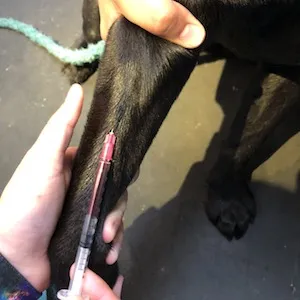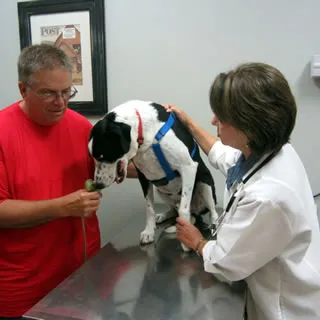Heartworm disease is a grave and potentially fatal condition that impacts countless dogs across the globe, including in the United States. Caused by foot-long worms dwelling in the heart, lungs, and associated blood vessels, it leads to severe respiratory issues, heart failure, and organ damage. While many pet owners are aware of heartworm disease, recognizing the early signs and symptoms of heartworm in dogs can be challenging, as the disease often progresses subtly in its initial stages. Understanding these indicators is crucial for timely diagnosis and effective treatment, ensuring your beloved canine companion receives the care they need to combat this pervasive parasitic threat. This comprehensive guide will delve into the intricacies of heartworm disease, focusing specifically on the primary keyword, “Signs And Symptoms Of Heart Worm In Dogs,” to empower you with the knowledge to protect your furry friend.
What Exactly is Heartworm Disease in Dogs?
Heartworm disease, scientifically known as dirofilariasis, is a serious condition caused by the parasite Dirofilaria immitis. Dogs are natural hosts for heartworms, meaning the worms can mature into adults, mate, and produce offspring within the dog’s body. If left untreated, the worm population can escalate dramatically, with some dogs harboring hundreds of worms. These worms inflict lasting damage to the heart, lungs, and arteries, significantly diminishing a dog’s health and quality of life long after the parasites are gone. This is why prevention is paramount, and when treatment becomes necessary, it should be administered as early as possible.
While this article primarily focuses on dogs, it’s worth noting that heartworm disease can also affect cats and ferrets, as well as wild species like wolves, coyotes, and foxes. These wild carriers, living in proximity to urban areas, play a significant role in the spread of the disease. In cats, the disease manifests differently, often with fewer adult worms but still causing considerable harm through a condition known as heartworm associated respiratory disease (HARD). Unlike dogs, cats cannot be treated with the same medications, making prevention their only safeguard.
 Macro close-up of heartworms in a petri dish, illustrating the parasites that cause canine heartworm disease
Macro close-up of heartworms in a petri dish, illustrating the parasites that cause canine heartworm disease
Understanding Heartworm Transmission: The Mosquito’s Role
The mosquito is an indispensable link in the heartworm life cycle. The process begins when an adult female heartworm residing in an infected animal (like a dog, fox, or coyote) produces microscopic baby worms called microfilariae. These microfilariae circulate in the bloodstream of the infected host. When a mosquito bites this infected animal and feeds on its blood, it picks up these tiny worms. Over a period of 10 to 14 days, inside the mosquito, these microfilariae develop and mature into “infective stage” larvae.
Once these infective larvae are ready, the mosquito becomes a carrier. When this infected mosquito subsequently bites another dog, cat, or susceptible wild animal, it deposits these infective larvae onto the surface of the new host’s skin. The larvae then enter the new host’s body through the tiny bite wound created by the mosquito. Inside the new host, it takes approximately six months for these larvae to mature into adult heartworms. Adult heartworms can live for an extended period – 5 to 7 years in dogs and up to 2 or 3 years in cats. This longevity means that each mosquito season can contribute to an increasing number of worms within an infected pet, exacerbating the disease’s severity over time.
The Critical Signs and Symptoms of Heartworm in Dogs
Recognizing the signs and symptoms of heart worm in dogs is crucial for early intervention. Unfortunately, in the early stages of heartworm infection, many dogs show few or no obvious symptoms. The manifestation of symptoms often depends on factors such as the duration of the infection, the number of heartworms present, the dog’s activity level, and the extent of damage to the heart, lungs, and associated blood vessels. The longer the infection persists, the more likely and pronounced the symptoms will become. Active dogs, those with heavy worm burdens, or dogs with pre-existing health conditions tend to exhibit clinical signs more prominently.
Early Stage Symptoms: Subtle Clues
When considering the signs and symptoms of heart worm in dogs in their initial phase, owners should be vigilant for subtle changes that might otherwise be dismissed. These early indicators are often mild and can easily be overlooked or attributed to other less serious conditions. They include:
- Mild Persistent Cough: This is often the first noticeable sign. It might sound like a soft, dry cough, particularly after exercise or excitement. Unlike a kennel cough, which can resolve quickly, a heartworm cough tends to persist. It’s a result of the worms irritating the blood vessels and lung tissue.
- Reluctance to Exercise: Dogs that are usually energetic might show a decreased willingness to play, go for walks, or engage in their normal activities. They may seem more tired than usual.
- Fatigue After Moderate Activity: Even routine activities that a dog once performed with ease, such as a short walk or a brief play session, may leave them unusually winded or exhausted. This is due to the heart and lungs struggling to cope with the increased demand for oxygenated blood.
These symptoms, while subtle, are the earliest clues your dog might be experiencing heartworm disease. It’s important to remember that these are not exclusive to heartworm and can indicate other health issues. For instance, sometimes puppies having blood in stool after deworming might also show lethargy, which could be mistaken for early heartworm fatigue. However, if you observe any combination of these signs, especially if they persist, a veterinary consultation is highly recommended.
Progressive Symptoms: When the Disease Worsens
As heartworm disease advances and the worm burden increases, the signs and symptoms of heart worm in dogs become more pronounced and severe. The damage to the cardiovascular and respiratory systems intensifies, leading to more obvious clinical signs:
- Persistent Cough: The mild cough progresses to a more frequent and noticeable cough, often dry, and sometimes accompanied by wheezing or difficulty breathing.
- Pronounced Fatigue and Lethargy: Dogs become significantly less active, tire easily, and may spend more time resting. Even minimal exertion can lead to extreme fatigue.
- Decreased Appetite and Weight Loss: Due to the internal damage and overall systemic impact of the worms, dogs may lose their appetite, leading to noticeable weight loss despite adequate food intake.
- Difficulty Breathing (Dyspnea): As lung damage worsens, dogs may exhibit labored breathing, even at rest. Their breathing might be shallow or rapid, and they may show obvious effort to inhale and exhale.
- Dull Coat and Poor Body Condition: Chronic illness can affect a dog’s overall appearance, leading to a dull, rough coat and a generally unkempt look.
- Swollen Belly (Ascites): In advanced cases, heart failure can occur. This leads to the accumulation of excess fluid in the abdomen, causing a distended or swollen belly. This is a clear indicator of severe cardiac compromise.
- Fainting or Collapsing: In some severe instances, particularly during exercise or excitement, a dog might faint or collapse due to insufficient blood flow to the brain and other vital organs.
These progressive symptoms indicate a more serious stage of heartworm disease, requiring immediate veterinary attention. The sooner treatment can begin, the better the prognosis for recovery and minimizing long-term damage.
Severe Heartworm Disease: Caval Syndrome (Life-Threatening)
The most severe and life-threatening form of heartworm disease is known as Caval Syndrome. This condition occurs when a very large number of heartworms migrate into the right atrium and vena cava (the large veins leading to the heart), causing a sudden blockage of blood flow within the heart. Caval syndrome is an acute and emergent condition marked by a sudden onset of critical signs and symptoms of heart worm in dogs:
- Sudden, Labored Breathing: Dogs will experience extreme difficulty breathing, gasping for air.
- Pale Gums: The mucous membranes, particularly the gums, will appear pale or bluish due to lack of oxygen.
- Dark Bloody or Coffee-Colored Urine: This indicates severe internal organ damage, often involving the kidneys, as red blood cells are destroyed.
- Collapse and Weakness: The dog will be extremely weak and may collapse.
- Rapid Heart Rate: The heart will beat rapidly in an attempt to compensate for the blocked blood flow.
Caval syndrome is an emergency situation. Without prompt surgical removal of the heartworm blockage, few dogs survive. This condition underscores the critical importance of regular heartworm prevention and early detection testing.
Why Early Detection and Annual Testing are Crucial
Heartworm disease is a progressive condition, meaning it worsens over time. The earlier it is detected, the better the chances for a successful recovery with fewer complications and less permanent damage to vital organs. As we’ve seen, there are often few, if any, early signs and symptoms of heart worm in dogs when they first become infected. This silent progression makes routine heartworm testing by a veterinarian incredibly important, even for seemingly healthy dogs.
A heartworm test requires only a small blood sample from your pet. This test works by detecting the presence of specific heartworm proteins (antigens) produced by adult female heartworms. Many veterinarians can process these tests in-house, providing rapid results, while others send samples to diagnostic laboratories. If your dog tests positive, your veterinarian will likely recommend further diagnostic tests, such as chest X-rays, blood work, and ultrasound, to assess the severity of the disease and plan the most appropriate treatment protocol.
All dogs, regardless of age or geographic location, should be tested annually for heartworm infection. This annual testing can typically be incorporated into your dog’s routine preventive care visit. For puppies under 7 months of age, prevention can often be started without an immediate heartworm test, as it takes at least six months for a dog to test positive after infection. However, these puppies should be tested six months after their initial visit, again six months later, and then yearly thereafter to confirm they remain heartworm-free. Adult dogs over 7 months of age who haven’t been on a preventive previously must be tested before starting prevention, and then retested six and twelve months later, followed by annual testing. If there’s been any lapse in prevention, immediate retesting and then another test six months later is essential.
Annual testing is non-negotiable, even for dogs consistently on year-round heartworm prevention. While heartworm medications are highly effective, they are not 100% foolproof. A missed dose, a dose given late, a forgotten pill, or a topical medication rubbed off prematurely can leave your dog vulnerable. Regular testing acts as a safety net, ensuring that if an infection does occur despite prevention efforts, it is caught early when treatment is most effective and least complicated.
 Veterinarian drawing a blood sample from a dog's leg for heartworm testing
Veterinarian drawing a blood sample from a dog's leg for heartworm testing
Assessing Your Dog’s Risk: Heartworm in All 50 States
Many factors contribute to a pet’s risk for heartworm infection, and it’s a mistake to assume your dog is safe simply because you believe heartworms aren’t common in your immediate area. The reality is that heartworm disease has been diagnosed in all 50 states of the U.S., and its geographic spread is constantly evolving. You might unknowingly travel with your pet to an area where heartworms are more prevalent, or the disease could be spreading into new regions annually.
Stray and neglected dogs, along with wildlife such as coyotes, wolves, and foxes, act as significant reservoirs for heartworms, carrying the infection and facilitating its spread. Even environmental factors contribute; mosquitoes can be carried great distances by wind, and the relocation of infected pets (as seen after events like Hurricane Katrina, where thousands of infected animals were moved across the country) can introduce the disease to previously uninfected locales.
Predicting risk factors is nearly impossible due to numerous variables, including climate fluctuations, the prevalence of mosquito species, the presence of wildlife carriers, and regional differences in prevention practices. These factors cause infection rates to vary dramatically, even within the same community from year to year. Furthermore, the notion that only outdoor dogs are at risk is a dangerous misconception; infected mosquitoes can easily enter homes, putting both indoor and outdoor pets in jeopardy.
For these compelling reasons, the American Heartworm Society (AHS) strongly advocates for their “Think 12” recommendation: (1) get your pet tested every 12 months for heartworm, and (2) administer heartworm preventive medication 12 months a year. This consistent, year-round approach provides the best protection against this ubiquitous threat.
 Map illustrating the incidence and prevalence of heartworm disease across the United States in 2019
Map illustrating the incidence and prevalence of heartworm disease across the United States in 2019
Navigating a Positive Heartworm Diagnosis: Treatment Steps
Receiving a positive heartworm diagnosis for your dog can be unsettling, but the encouraging news is that most infected dogs can be successfully treated. The primary goal of treatment is to stabilize your dog if they are showing active signs and symptoms of heart worm in dogs, then to eliminate all adult and immature worms while minimizing potential side effects.
Here’s what you should expect if your dog tests positive for heartworms:
- Confirm the Diagnosis: Since heartworm treatment is both expensive and complex, your veterinarian will typically confirm the initial positive antigen test with an additional, different diagnostic test. This ensures absolute certainty before proceeding with treatment.
- Restrict Exercise: This is a critical, albeit challenging, step. As soon as the diagnosis is confirmed, your dog’s physical activity must be severely restricted. Physical exertion increases the rate at which heartworms cause damage to the heart and lungs. The more severe your dog’s symptoms, the more stringent the exercise restriction will be. This might mean strictly supervised leash walks only, or even complete cage rest.
- Stabilize Your Dog’s Disease: Before the actual heartworm-killing medication can be administered, your dog’s condition may need to be stabilized. This could involve medications to reduce inflammation, improve heart function, or manage other complications. In severe cases, this stabilization period could last several months.
- Administer Treatment: Once your veterinarian determines your dog is stable and ready, they will recommend a specific treatment protocol. The American Heartworm Society provides comprehensive guidelines for these treatment plans. Dogs with no or mild signs and symptoms of heart worm in dogs (like a cough or exercise intolerance) generally have a very high success rate with treatment. More severe disease can also be successfully treated, though the possibility of complications is higher. It’s important to note that the severity of symptoms doesn’t always correlate with the number of worms; dogs with many worms may show few early symptoms.
- Test (and Prevent) for Success: Approximately six months after the completion of treatment, your veterinarian will perform another heartworm test to confirm that all heartworms have been eliminated. To prevent re-infection, administering year-round heartworm prevention for the rest of your dog’s life is essential.
Throughout the treatment process, close communication with your veterinarian is vital to monitor your dog’s progress and manage any potential side effects.
 Dog resting comfortably in a spacious veterinary recovery cage after heartworm treatment
Dog resting comfortably in a spacious veterinary recovery cage after heartworm treatment
Preventing Heartworm Disease: Your Dog’s Best Defense
Preventing heartworm disease is significantly easier, safer, and less costly than treating an established infection. It’s truly the best defense for your dog against this debilitating parasite.
How Heartworm Preventives Work
Whether administered as a monthly pill, a topical spot-on medication, or a long-acting injection, all approved heartworm preventives function by eliminating the immature (larval) stages of the heartworm parasite. This includes the infective heartworm larvae deposited by mosquitoes and the subsequent larval stage that develops within the animal. It’s crucial that these immature stages are eliminated before they can mature into adults. In as little as 51 days, immature heartworm larvae can molt into an adult stage, which cannot be effectively eliminated by preventives. Therefore, strict adherence to the administration schedule (monthly for oral/topical products, every 6-12 months for injectables) is extremely important. Administering prevention late can allow larvae to reach the adult stage, making prevention ineffective.
When to Start Prevention for Puppies and Adult Dogs
The risk of puppies contracting heartworm disease is equivalent to that of adult pets. The American Heartworm Society recommends starting puppies on a heartworm preventive as early as the product label permits, typically no later than 8 weeks of age.
Heartworm medication dosage is based on body weight, not age. Puppies grow rapidly, and their growth rate varies significantly by breed. This means a young animal can quickly gain enough weight to require a dosage change within a few weeks. Always consult your veterinarian for advice on anticipating dosage changes and ensure you bring your puppy for all scheduled well-puppy exams. This proactive approach helps you stay on top of all health issues, including heartworm protection, and confirms you are administering the correct dosage.
The Importance of a Veterinary Prescription
In the U.S., heartworm preventives require a prescription from a licensed veterinarian. This FDA labeling mandate ensures that these powerful medications are used appropriately and safely. Before prescribing, veterinarians typically perform a heartworm test to confirm your pet doesn’t already have adult heartworms. Giving preventives to an already infected dog can, in rare cases, lead to severe or even fatal reactions. Very young puppies or kittens usually don’t need pre-testing, as it takes approximately six months for heartworms to mature to adulthood and be detectable. If the heartworm test is negative, prevention medication is then prescribed. This safeguards against potential adverse reactions and ensures the medication is used effectively.
 Veterinarian gently examining a dog's health during a routine check-up
Veterinarian gently examining a dog's health during a routine check-up
Debunking Natural Prevention & Vaccine Myths
When it comes to heartworm prevention, only products thoroughly tested and proven effective by regulatory bodies like the U.S. Food and Drug Administration (FDA) should be used. Currently, there is no commercially available vaccine for the prevention of heartworm disease in dogs or cats, though research continues in this area. Therefore, heartworm disease can only be prevented through the regular and appropriate use of prescription preventive medications. These medications are available in various forms—chewables, topicals, and injectables—and many also offer the added benefit of preventing other common parasites. For example, while talking about various parasites, it’s worth noting that if you’re concerned about other internal parasites, understanding the risk of human transmission of dog roundworms or likelihood of getting roundworms from dogs is also important for comprehensive pet and family health. Similarly, concerns about external parasites like mites, and questions like can humans get mites from dogs often arise, highlighting the need for broad-spectrum parasite control. If your dog is dealing with ear mite treatment for dogs, it’s clear that ongoing parasite management is a multifaceted effort beyond just heartworms.
 Close-up of a veterinarian's hands gently examining a dog's paw during a physical exam
Close-up of a veterinarian's hands gently examining a dog's paw during a physical exam
Year-Round Prevention: Even in Colder Climates
Even in regions with cold winters, the American Heartworm Society strongly recommends year-round prevention. Heartworms have been found in every state, and mosquito seasons can vary in duration even within a single state. Mosquito species are constantly adapting, and some can successfully overwinter indoors. Year-round prevention is the safest approach, providing continuous protection. Furthermore, many heartworm preventives also deworm your pet for intestinal parasites, which can pose serious health risks for humans if left untreated.
What Happens if You Miss a Dose?
If you have missed one or more doses of your dog’s heartworm preventive, you need to consult your veterinarian immediately. They will advise you to restart the monthly preventive and then retest your dog approximately six months later. This re-testing is crucial because heartworms must be about seven months old before an infection can be reliably diagnosed through standard antigen tests. This delay ensures that any potential infection that occurred during the lapse in prevention has had time to mature enough to be detectable.
What Causes a Dog to Die from Heartworm Disease?
Heartworm disease is complex and can affect multiple vital organs, including the heart, lungs, kidneys, and liver. The outcome of infection varies greatly among patients. The adult worms cause inflammation of the blood vessels and can physically block blood flow, leading to pulmonary thrombosis (blood clots in the lungs) and heart failure. These “foot-long” parasites inflict severe damage, leading to chronic inflammation and scarring in the pulmonary arteries. This increased pressure and damage put immense strain on the right side of the heart, eventually causing it to fail.
Heartworm disease can also lead to secondary liver or kidney failure as these organs struggle to cope with the compromised cardiovascular system and the presence of parasites. Dogs exposed to a large number of infective larvae simultaneously are at significant risk of sudden death due to massive numbers of developing larvae overwhelming the vascular system. Other animals may live for a long time with only a few adult heartworms, showing no clinical signs until faced with an environmental stressor (like an extreme increase in temperature) or another significant health problem that exacerbates their underlying condition. Ultimately, the cumulative organ damage, particularly to the heart and lungs, is what tragically leads to a dog’s demise from heartworm disease.
 Gross pathology image showing the severe impact of heartworms within a dog's heart and major blood vessels
Gross pathology image showing the severe impact of heartworms within a dog's heart and major blood vessels
Conclusion: Vigilance and Prevention are Key
Understanding the signs and symptoms of heart worm in dogs is a critical first step for any responsible pet owner. While early symptoms can be subtle, an informed owner can catch these clues and seek veterinary attention promptly. However, the silent progression of heartworm disease underscores the even greater importance of year-round prevention and annual testing. This proactive approach, guided by your veterinarian, is the most effective way to protect your dog from this prevalent and potentially fatal parasitic infection. By staying vigilant, committing to consistent prevention, and adhering to recommended testing schedules, you provide your dog with the best chance for a long, healthy, and happy life, free from the devastating effects of heartworm disease.
References
- American Heartworm Society. (n.d.). Heartworms in Dogs. Retrieved from https://www.heartwormsociety.org/heartworms-in-dogs
- U.S. Food and Drug Administration (FDA). (n.d.). Heartworm Prevention and Treatment. Retrieved from https://www.fda.gov/animal-veterinary/animal-health-literacy/heartworm-prevention-and-treatment
- Centers for Disease Control and Prevention (CDC). (n.d.). Parasites – Heartworm. Retrieved from https://www.cdc.gov/parasites/heartworm/index.html
